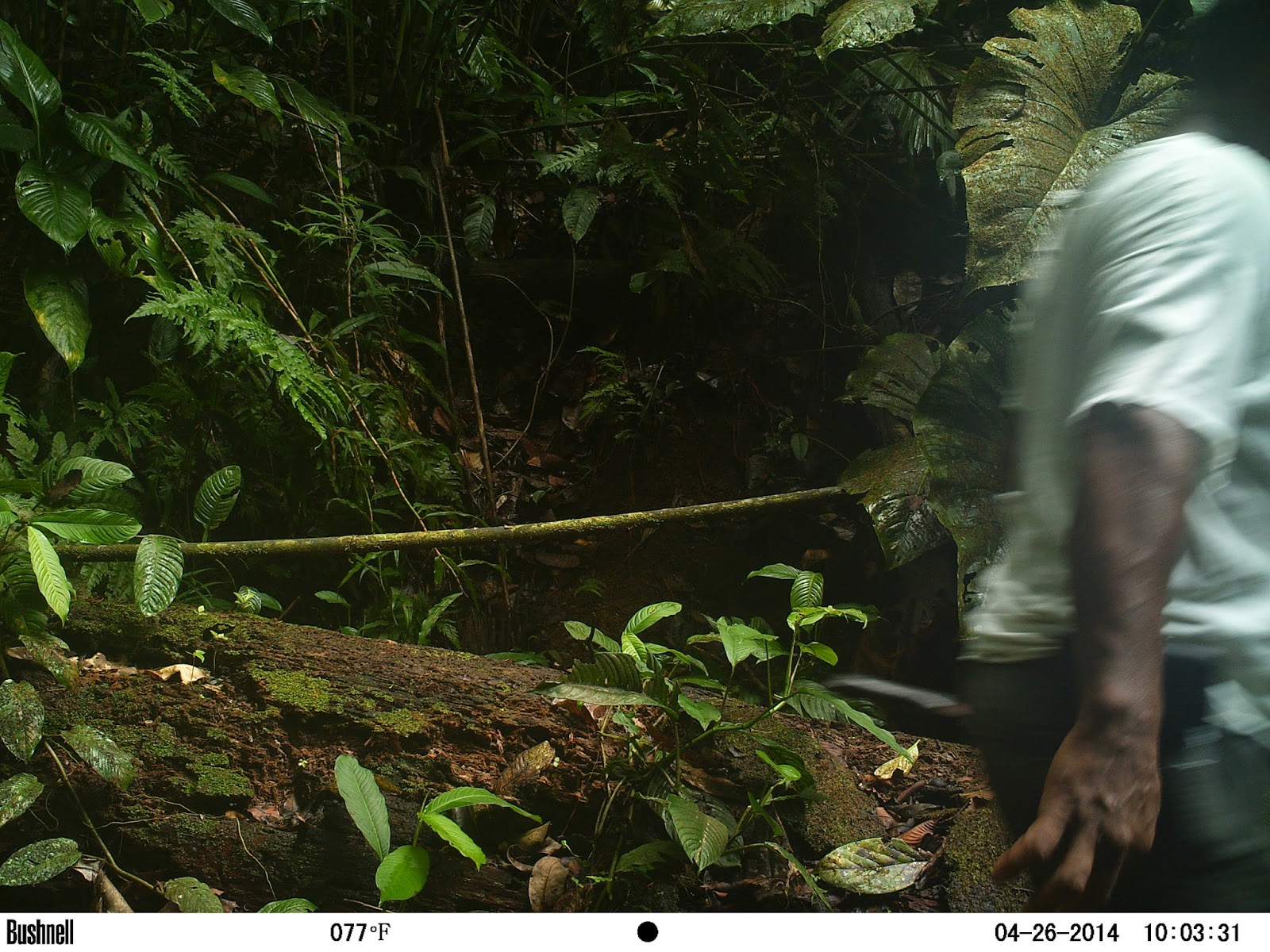 | ||||
| Endangered Squirrel Monkeys on the Camera Trap |
Project History and Results
In May of 2013, we began this campaign on crowd-funding site Indiegogo.The goal was to raise enough funds to purchase camera traps and support materials to do a thorough survey of the biodiversity of the Ocho Verde wildlife reserve in southern Costa Rica.
Well, a year has passed...the results were EXCELLENT!
When you start out on projects like this, you really never know what you will find. Nor will you know what obstacles may impede your progress. While we suspected that the biodiversity would be numerous and varied, we had no idea how intense that it would be. It seems that the forest is harboring a lot of animals. Yes, we have been through nearly 20,000 images, and to be honest, 15,000 were probably Agoutis. That being said here is a list of the 20+ mammals:
- Ocelots--at least 3 of them, possibly as many as 5 of both sexes.
- Neotropical River Otter
- White Nosed Coati
- Agouti
- Paca
- Squirrel Monkey
- Jaguarundi-at least 3 of them
- Common Possum
- 9 Banded Armadillo*
- Tayra--at least one male and possibly a female
- Kinkajou
- Water Opossum
- Anteater-Northern Tamandua
- Capuchin Monkeys
- Wooly Opossum
- Dogs
- Striped Skunk*
- Human Poachers
- Spiny Rats
- Water Rats
- Bats different species
- Squirrels
 |
| A Blue Crowned Motmot...chillin'. |
- Tinamou-2 species
- Curassow
- White Hawk
- Trogans
- Orange billed Sparrow
- 2 types of doves
- Vulture
- Little Blue heron
- Cattle Egret
- MotMot
More and more animals...
Most encouraging, is that the ocelots, agoutis, pacas, coatis, spiny rats, anteaters, tinamous, and squirrel monkeys that we have seen, have offspring. Reproducing animals certainly make for a healthy forest ecosystem. |
| Anteater carrying young |
 | |
| Paca mom and young paca. |
Ocelot Recognition
So far, we can identify 3."Roi/Crooked Tail"
her cub, "Pizza-Slice"
... and "Big Male"(note that Big Male seems to care less about the bright camera lights).
We are continuing to look at the ocelot rosette patterns to help identify more individuals.
About the trails...
All of the cameras were placed on established trails,with one one exception. The coatis, jaguarundis, tayra, common opossums, and ocelots were seen at the most distant camera, nearest camera, highest camera, and lowest camera. For example, Ocelot Pizza Slice, was seen on all of the cameras. We believe this to mean that animals like and use the trails. We also have seen animals following 'animal' trails into other parts of the forest.The only unestablished trail is the tree that is crossing the creek, which animals, of a all sorts, used as a bridge.
About the cameras...
The Bushnells and the Moultries recorded thousands of images of varying degrees of quality. While sharp images don't make good fodder for blogs, you can glean a lot of information from them. The Bushnells were far better on battery consumption and durability, and not so great on consistent image quality. The Moultries made ok videos and ok pictures and were ok on battery power. The color HCO Scoutguards do make nice images for videos with good color night and day shots, but seem to run out of battery power faster than the other cameras. The old Cuddeback worked great until it failed(nearly 4 years of use). The new Cuddeback was pitiful from day 1 in both image quality and battery use. We now have a Browning to add to the mix.
The good news about the cameras is that all have been serviced/repaired or replaced under their great warranties (we are still talking to Cuddeback about a solution). We thank the manufacturers for sticking with us through our adverse situations.
HCO Scoutguard had offered us a wireless camera to use. It did not arrive in time to deploy on the July trip, but we have it in house now and it is ready to go. A second wireless camera has been contributed by an individual. The route will be animal->camera->cell tower->email address, in early real time information. We hope to work with an international organization to get the info out to the WWW(more about that when it happens). Needless to say, we are very excited by this and sincerely thank them for the contributions.
Setbacks and Problems
No project is without it's share of setbacks and problems. Camera traps aren't really made for jungle environments. Many of the infrared cameras had problems finding enough light to make make color pictures during the daylight and 'flipped' to night-time mode. This is why you see black and white images during the day. The color cameras had similar problems as well: not enough light for a slow shutter-speed. We had our share of leaky batteries. Sensors failed, causing the cameras to continuously take pictures until the batteries died. Leafy plants sprang up in front of lenses. Spiders seemed to enjoy making webs on the lenses. One camera was partially infiltrated by ants. Good cameras sometimes failed for unknown reasons. Perhaps it was the humidity. While we did see poachers, they did not see us(we think). In an entire year there were only 3 days when they were caught on camera, none had any game.The Best Of Year One
Battery Waster Award--- Agoutis
Least Expected Animal-Tie-Neotropical River Otter and Striped Skunk
 |
| This is a screen shot from a video of the skunk. |
Coolest Video- 3 Jaguarundi Walking, runner up the White Hawk
Most Adoring Critter-The Tayra
Scariest Monkey-Armless Ghost Monkey(Capuchin)
Best Bird-Curassow- runner up MotMot
Best Predation- Tayra with Iguana
Most Unexplained--The Mystery Smoke at 4:15am
Least Favorite Images--Poachers
Best Overall Image-Jaguarundi
That is all for now.
Remember, that you can subscribe to this blog or follow on YouTube.
We were also named as one of the best camera trappers to follow on Twitter Follow @OchoVerde
See you soon!
Leave you comments below.

















